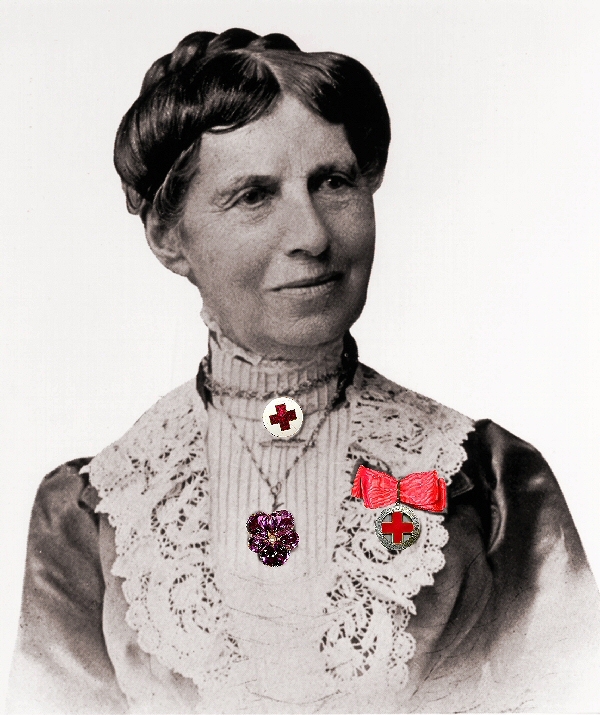Hello
everyone! Here’s another installment of my series on Clara Barton, which I am
writing as a part of my quest to get the Clara Barton Civil War 150th Anniversary Junior Ranger Badge.
Today
is a special day to be talking about Clara Barton and her accomplishments
because today, May 21, 2013, is the 132nd Anniversary of the
American Red Cross! So, Happy Birthday American Red Cross! :)
The American Red Cross is dedicated to helping people in need throughout the United States and the world. They depend on monetary donations, blood donations and volunteers to support their lifesaving programs and services. Take some time to honor the American Red Cross by donating blood this week, or by donating money to help the victims of the devastating tornado which ravaged the state of Oklahoma on Monday.
The American Red Cross is dedicated to helping people in need throughout the United States and the world. They depend on monetary donations, blood donations and volunteers to support their lifesaving programs and services. Take some time to honor the American Red Cross by donating blood this week, or by donating money to help the victims of the devastating tornado which ravaged the state of Oklahoma on Monday.
 |
| Clara Barton, Founder of the American Red Cross. Photo Courtesy redcross.org |
 |
| Image Courtesy nps.gov Clara Barton's informative pamphlet about the Red Cross for Congress and the American People. |
To the People of the United States, Senators and Representatives in Congress:
Having had the honor conferred upon me of appointment by the Central Commission holding the Geneva Convention to present that treaty to this Government, and to take in charge the formation of a National organization according to the plan pursued by the committees working under the treaty, it seems to me but proper, that while I ask the Government to sign it, the people and their representatives should be made acquainted with its origin, designs, methods of work, &c. To this end I have prepared the following statement, and present it to my countrymen and women, hoping they will be led to indorse and sustain a benevolence so grand in its character, and already almost universal in its recognition and adoption by the civilized world.
CLARA BARTON,Washington, D.C.
Despite her tireless efforts, the treaty would not be signed until 1882, when it was finally signed by President Arthur.
 |
| Photo Courtesy of nps.gov Clara Barton, 1878, wearing the Red Cross pin given to her by the Germans for her service during the Franco-Prussian War. |
One
of their more famous aid projects during Barton's tenure came in 1893 when a hurricane and tidal wave
hit the Sea Islands of South Carolina, leaving over 5,000 people dead. She worked
for 10 months helping the predominantly African-American population of the area
recover, rebuild and reestablish their agricultural economy.
Her last project before she left the agency in 1904 was to assist with hurricane and tidal wave victims of Texas in 1900. She gave financial assistance and supplies to the survivors which were valued at over $120,000.
Barton was the Red Cross’ strongest advocate for the International Red Cross agencies to do more than provide wartime services. Although she was not the first person to suggest it (Henry Dunant was in 1864), Barton pushed to have an amendment to the Geneva Treaty passed that would allow relief to reach international victims of natural disasters in addition to the wartime services they provided. Some nations were unsure about the measure, but the resolution passed in 1864 and would later be known as the “American Amendment” to the Geneva Treaty. Because of her persistence and the passing of this resolution, it became possible for relief efforts to be expanded. Many countries honored her for this effort, including Germany and Russia for the relief she provided to those countries during the Franco-Prussian war and the Russian famine, respectively. The honors included the German Iron Cross and the Imperial Silver Cross of Russia.
After
Barton left the Red Cross, the agency moved in a new direction. This new
direction was marked during the Spanish-American War, when the organization
delivered supplies and services to Cuba. This aid was distributed to American
armed forces, prisoners of war and Cuban refugees. This action marked the first
time that the organization provided assistance to both American armed forces
and civilians during a war.
The
American Red Cross has continued to grow and expand over the years. When disaster
strikes, the world looks to the Red Cross for help; it is a force larger than
itself, assisting others without judgment or prejudices. It has become a strong
and recognizable symbol synonymous with relief efforts, both foreign and
domestic, natural disasters or otherwise. And without Clara Barton's tireless efforts, none of it would have been possible.
Explore
on, Junior Rangers! :)
Source: redcross.org

No comments:
Post a Comment